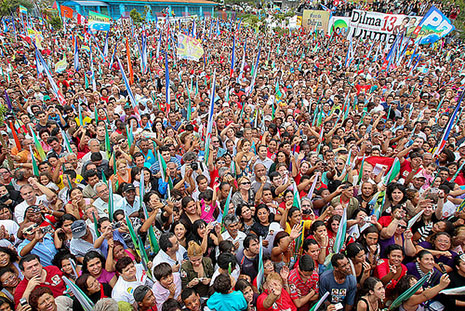AT A TIME when many Western democracies are experiencing a wave of social conservatism, Brazilians have used the presidential election to confirm the transformative power of politics. Last weekend the Workers’ Party candidate, economist Dilma Rousseff, was elected president of Brazil. Ms Rousseff won 56 per cent (approximately 55.7 million) of votes and defeated the candidate of the Party of the Brazilian Social Democracy, José Serra.
The coverage of the elections highlighted the fact that Ms Rousseff is the first female president of Brazil. Indeed, if there is one clear message the majority of Brazilians sent in this election, it is that they are willing to support change and innovation, regardless of the sex of the candidate. In the first round of the presidential election the Green Party candidate, environmental activist Marina Silva, emerged as the great surprise and captured 20 per cent of votes, much of which would have gone to the Workers’ Party in the final round.
But the significance of the election goes beyond individual performances. Looked at within the context of South American political history, these elections are a reminder that participatory democratic politics has the potential to fuel social change.
Although Brazil has been a republic since 1889, its first decades of electoral politics were dominated by a mixture of elite pacts and efforts to build “the nation” under heavy state control. By the 1960s, the legacies of these arrangements were rigid social stratification and extreme inequality, which left the majority of people without the benefits of the country’s wealth. It was the middle- and upper-class fear of an upheaval among the poor that helped sustain the military regime between 1964 and 1985.
In those years, Brazilians shared with their South American neighbours the dark experience of authoritarianism, with the absence of rule of law undermining any notion of citizenship and rights. During the Brazilian “economic miracle” of the early 1970s, annual growth rates reached 11 per cent, but the price paid by most citizens was a lack of opportunity to break free of their predetermined place in the social order.
From the mid 1970s the military initiated a slow process of political liberalisation. While labour unions, the slum movements and progressive sectors of the Catholic Church became well-known actors in the fight against dictatorship, ordinary people also played a fundamental role. The campaign for popular presidential elections – Diretas Já (“Direct elections, now”) – gained momentum in 1984 and brought millions of Brazilians onto the streets. Among those actively involved in the campaign were Fernando Henrique Cardoso (president, 1995–98 and 1999–2002), Luiz Inácio Lula da Silva (president, 2003–06 and 2007–10), and Dilma Rousseff.
The massive popular support for Diretas Já was one of those moments in history when ordinary people’s rejection of the established order becomes so intense that it is almost impossible for them to remain silent. The history of South American democratisation “from below” provides other inspiring examples: Argentina’s mothers and grandmothers of the disappeared humanised politics and infused it with notions of care and compassion, for example; and the role of the Coalition of Parties for NO in Chile’s 1988 referendum gave Chileans an opportunity to reject General Pinochet, surprising conservative forces with an assertion of the courage that years of repression had not eliminated.
In 2002, only two decades after the darkest period, Brazilians elected as president the Workers’ Party candidate, Luiz Inácio Lula da Silva, a metalworker and labour union leader. Free-market ideologues threatened to punish the country with capital flight and poor investment ratings. I still remember a sad conversation with a young expatriate professional who had decided to move back to the United States. He explained to me that the Brazilian people had made a mistake and warned that we would suffer for it. Now, as we approach the third consecutive Workers’ Party administration, Brazil is not only the ninth-largest economy in the world but managed to remain stable even in the face of the 2008 financial crisis.
It has to be recognised that the recent social improvements were to a great extent facilitated by the economic stabilisation and democratic credentials of the former president, Fernando Henrique Cardoso, from the Party of the Brazilian Social Democracy. Nevertheless, the victory of the Workers’ Party revealed a significant change in the Brazilian mindset. Suddenly, in a society in which the elite once celebrated opulence and all things European as symbols of status, ordinary Brazilians had reached the corridors of power.
Odd political arrangements will undoubtedly continue to emerge, especially in a multiparty system in which political survival is heavily dependent on coalitions. But considering how recently Brazil moved towards participatory democracy, these tensions are an inevitable part of the creative chaos that accompanies change. And while fiscal discipline continues to be the economic mantra, innovation in social policy has contributed to improvements in human development indicators. The Bolsa Família, launched in 2003 and now the world’s largest conditional cash-transfer program, had benefited approximately forty-six million Brazilians by 2008, contributing to a dramatic reduction in poverty from around 34 per cent in 2003 to 21.5 per cent in 2009. The success of the program has inspired similar policy initiatives throughout Latin America and the United States. Inequality in income distribution, although still among the world’s highest, has also decreased. Moreover, judged by the astonishing support received by the Green Party’s candidate, it would appear that many Brazilians are aware that environmental sustainability is a central component of the country’s development agenda.
Because Brazilians now enjoy freedom of expression, and can gather in public for all sorts of causes without the fear of state repression, it is easy to forget that history and focus on the problems that continue to afflict the country. Corruption, urban violence and a model of growth that struggles to balance business priorities with environmental sustainability, are still major challenges.
Still, the fact that these issues can be openly discussed, and that Brazilian civil society now articulates new paths to challenge old concepts of social order, shows how far society and the state have come in recent decades.
The “Brazilian model” of democratic development doesn’t fit into quick-and-easy ideological models. Its grassroots orientation makes it dynamic and unpredictable, a complex setting for those who search for clear-cut answers. As a Brazilian who constantly complained about the country’s inability to move from its position of “attractive eternal teenager,” for the first time I feel that Brazil has moved into adulthood.
It is too early to know whether we will learn how to age wisely. But the results of the 2010 election show that the Workers’ Party campaign slogan – “so that Brazil will continue to change” – certainly appeals to the Brazilian people at this point in the country’s history. In 2010 this nation of 192 million people has more to celebrate than economic performance. •




